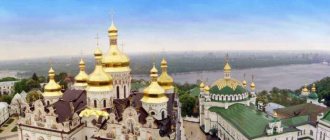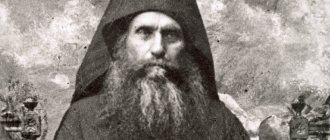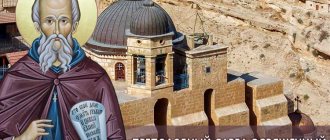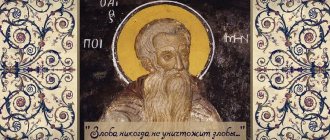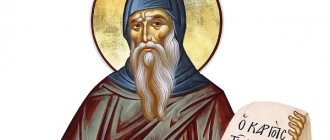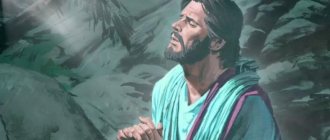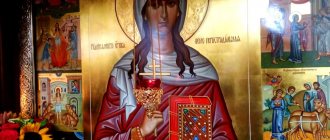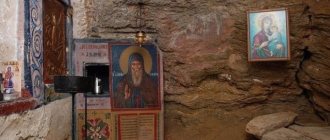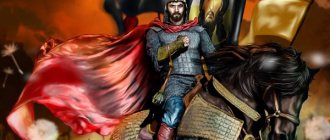| St. Anthony the Great, icon of the 2nd half of the 16th century. |
Anthony the Great
(c. 251 - 356), hermit of the Egyptian desert, founder of hermit monasticism, venerable Memory January 17
Born in the city of Kom (now Kumans, Egypt) around 251 from noble and wealthy parents who raised him in the Christian faith. At the age of eighteen, he lost his parents and was left alone with his sister, who was in his care. One day he was going to church and thinking about the holy apostles, how they left everything to follow the Lord. He enters the temple and hears the gospel words: “If you want to be perfect, go, sell what you have and give to the poor, and you will have treasure in Heaven, and follow Me” (Matthew 19:21). These words struck Anthony, as if they were spoken by the Lord personally to him. Soon after this, Anthony renounced the inheritance from his parents in favor of the poor inhabitants of his village, but was perplexed as to whom he would leave his sister to. Concerned with this thought, he enters the temple another time and hears there again the words of the Savior addressed to him: “Do not worry about tomorrow: tomorrow will take care of itself; Sufficient for each day is your own care” (Matthew 6:34). Anthony entrusted his sister to Christian virgins known to him and left the city and home to live in solitude and serve the Lord alone.
The departure of the Monk Anthony from the world did not happen suddenly, but gradually. At first he stayed near the city with a pious elder who lived in solitude and tried to imitate him in everything. He also visited other hermits who lived in the vicinity of the city and took their advice. Already at this time he became so famous for his exploits that he was called “the friend of God.” Then he decides to move on. He calls the old man with him, and when he refuses, he says goodbye to him and settles in one of the remote caves. One of his friends brought him food from time to time. Finally, Saint Anthony leaves completely from inhabited places, crosses the Nile River and settles in the ruins of a military fortification. He brought with him bread for six months, and after that he received it from his friends only twice a year through a hole in the roof.
He suffered from hunger and thirst, from cold and heat. But the most terrible temptation of the hermit, according to Anthony himself, is in the heart: this is longing for the world and agitation of thoughts. To all this were added temptations and horrors from demons. Sometimes the holy ascetic became exhausted and was ready to fall into despondency. Then either the Lord Himself appeared or sent an angel to encourage him. “Where have you been, good Jesus? Why didn’t you come to end my suffering first?” - Anthony cried when the Lord, after one severe temptation, appeared to him. “I was here,” the Lord told him, “and I waited until I saw your feat.”
One day, amid a terrible struggle with thoughts, Anthony cried out: “Lord, I want to be saved, but my thoughts won’t let me.” Suddenly he sees someone similar to him sitting and working, then he got up and began to pray, then he sat down to work again. “Do this and you will be saved,” the angel of the Lord told him.
Anthony had already lived twenty years in his solitude, when some of his friends, having learned of his whereabouts, came to settle around him. For a long time they knocked on his door and asked him to come out to them from his voluntary imprisonment; They finally decided to break down the doors when Anthony opened them and went out. They were surprised to find no traces of exhaustion in him, although he subjected himself to the greatest hardships. Heavenly peace reigned in his soul and was reflected on his face. Calm, reserved, equally friendly to everyone, the elder soon became the father and mentor of many. The desert came to life: in the mountains all around there appeared abodes of monks; many people sang, read, fasted, prayed, worked, and served the poor. Saint Anthony did not give his disciples any specific rules for monastic life. He cared only about instilling in them a pious mood, instilling in them devotion to the will of God, prayer, renunciation from everything earthly, and tireless work.
But Saint Anthony, in the desert itself, was burdened by the crowds and sought new solitude. “Where do you want to run?” - there was a voice from the sky when he was waiting on the banks of the Nile for a boat to get away from people. “To the upper Thebaid,” answered Anthony. But the same voice objected to him: “Whether you sail up to Thebaid, or down to Bucolia, you will have no peace either there or here. Go to the inner desert." This was the name of the desert that lay near the shores of the Red Sea. Anthony went there, following the passing Saracens.
After three days of travel, he found a wild, high mountain with a spring of water and a few palm trees in the valley. He settled on this mountain. Here he cultivated a small field, so that now no one needed to come to him and bring bread. From time to time he visited the brethren. The camel carried bread and water to maintain his strength during these difficult journeys through the desert. However, admirers of Saint Anthony also discovered his last solitude. Those who sought his prayers and instructions began to come to him in large numbers. They brought the sick to him; he prayed for them and healed them.
Saint Anthony had lived in the desert for about seventy years. Against his will, the proud thought that he was older than everyone here began to confuse him. He asked God to remove this thought from him and received a revelation that one hermit had settled in the desert much earlier than him and was serving the Lord more than him. Anthony got up early in the morning and went to look for this ascetic unknown to the world. I walked the whole day and did not meet anyone except desert animals. An immense space spread out before him, but he did not lose his hope. Early in the morning he went again. A she-wolf flashed before his eyes, running towards the stream. Saint Anthony approached this stream and saw a cave near it. At the sound of his footsteps, the door to the cave closed tightly. Until noon, Saint Anthony called out through the door to the unknown ascetic and asked to show him his face. Finally, the door opened and a very old man, completely white with gray hair, came out to meet him. It was Saint Paul of Thebes. He had already lived in the desert for about ninety years.
After the brotherly kiss, Paul asked Anthony: “What is the condition of the human race? What kind of government is there in the world? Are there still idolaters left? The end of persecution and the triumph of Christianity in the Roman Empire was good news for him, but the emergence of Arianism was bitter news. While the elders were talking, a raven came down to them and laid down some bread. “The Lord is generous and merciful,” Paul exclaimed. “This is how many years I have received half a loaf of bread from Him every day, but now for the sake of your coming He has sent a whole loaf of bread.”
The next morning, Paul revealed himself to Anthony that he would soon depart from the world; therefore, he asked Anthony to bring to him the mantle of Bishop Athanasius in order to cover his remains with it. Anthony hastened to fulfill the desire of the holy elder. He returned to his desert in great excitement and to the questions of his brother monks he could only say: “Sinner, I considered myself still a monk! I saw Elijah, I saw John, I saw Paul in heaven." On the way back to Saint Paul, he saw him ascending to heaven among a host of angels, prophets and apostles.
“Why, Pavel, didn’t you wait for me? - Anthony exclaimed. “I recognized you so late and you are leaving so early!” However, when he entered Paul's cave, he found him silent and motionless on his knees. Anthony also knelt down and began to pray. After several hours of prayer, he was convinced that Paul was not moving because he was dead. He reverently washed his body and wrapped him in the mantle of St. Athanasius. Suddenly two lions appeared and with their claws dug a rather deep grave, where Anthony buried the holy ascetic.
He died at a very old age (106 years old, in 356) and for his exploits earned the title of the Great. A monastery was founded on the site of his exploits.
In the “Lives of the Saints” of St. Demetrius of Rostov it is mentioned that the relics of St. Anthony were discovered and transferred to Alexandria in 561 under Emperor Justinian, then around 635 they were transported to Constantinople. In 980 they were transferred to the city of Arles in Gaul (present-day France), to the church of St. Juliana. However, in the monastery of St. Anthony they believe that the relics of this saint of God were not discovered, and are now hidden in the monastery church named after him [1].
The Monk Anthony founded hermit monasticism. Several hermits, under the guidance of one mentor - Abba, lived separately from each other in huts or caves (monasteries) and indulged in prayer, fasting and labor. Several monasteries united under the authority of one abba were called a monastery. But even during the life of Anthony the Great, another kind of monastic life appeared. The ascetics gathered in one community, carried out joint labors, each according to their strength and abilities, shared a common meal, and obeyed the same rules. Such communities were called cenovia or monasteries. The abbas of these communities began to be called archimandrites. The Monk Pachomius the Great is revered as the founder of cenobitic monasticism.
The childhood and adolescence of St. Anthony
The Monk Anthony the Great was an Egyptian by birth. He was born in 251, into a noble, wealthy family, in the village of Koma (near Heliopolis).
Anthony's parents were Christians, and he grew up and was brought up on the Testaments of Christ. Anthony spent his early childhood in his parents' home. When he reached adolescence, and was supposed to be sent to learn to read and write, he preferred to stay closer to his parents, not wanting to either leave his father’s house or communicate with his peers.
In general, he was an obedient child, willingly visiting God’s temple with his mother and father, listening carefully to what was read there. Despite the enviable family budget, Anthony was not a spoiled child; he did not demand exquisite dishes and other excesses; he was content with what was given, and given, for pedagogical purposes, in moderation.
Maximian
Saint Anthony the Great knew how to speak inspired speeches and thereby consoled the suffering, reconciled those at war, and some of them took the monastic path. Over time, other monks began to settle near the hermit’s cell. And listening to the will of God, he became their spiritual mentor. Monasteries at that time were built in the likeness of such monasteries.
But in 308, Emperor Maximian carried out severe persecution of Christians, whose blood flowed in rivers. The holy martyrs were sent to Alexandria for trial, and Anthony followed them to participate in the dispute with the Arians. He wanted to die for Christ, but did not want to deliberately provoke the rulers to execution. And this was contrary to God's providence.
During this period, he helped, as best he could, the courageous confessors imprisoned in prison. But most importantly, he supported them spiritually and called for steadfastness of faith.
Calling of God
After the death of his parents, Anthony remained the eldest. Caring for the household and his little sister fell on his shoulders. By that time he was quite an adult (according to ancient sources he was between 18 and 20 years old).
A few months after he was orphaned, an incident happened to him that dramatically influenced his future life. One day, Anthony, according to custom and the desire of his heart, went to the temple. Along the way, I gave myself over to thought: I remembered the apostles who left everything and followed Christ, I remembered those believers who, when selling their property, brought the funds they had handed over and humbly laid them down before the Lord’s disciples.
As soon as he entered the threshold of God's temple, he heard words that sounded as if from the lips of the Redeemer Himself. These were words from the Gospel addressed to a rich young man, spoken by Jesus Christ (Matthew 19:21) and which formed the basis of one of the most important monastic vows - non-covetousness. Anthony took the meaning of these sublime words - whoever wants to be perfect must sell what they have and follow the Savior - as closely as if they were addressed to him personally.
Leaving the temple, he immediately sold everything that he inherited from his deceased parents (and this was a lot: tens of hectares of fertile land alone), distributed part of the funds to local residents so that neither his sister nor himself would be disturbed, he left part of it to his sister, and He gave some of it to the poor.
Once again entering the temple of the Lord (shortly after what happened), Anthony heard other words from the Gospel that were based on Providence (Matthew 6:34) and again took them to himself. He immediately returned, distributed the remains of his property to the poor, entrusted his sister to the care of the virtuous virgins who lived in the monastery, and, settling down near his home, devoted himself to solitude and prayerful deeds.
Difficulties
All the residents of the surrounding area saw Anthony's good deeds and treated him with great respect. But this interested him least of all, since he constantly indulged in a more difficult feat - prayer vigil, which he could spend whole nights. He ate once a day - after sunset. His food was the simplest - bread with salt and plain water.
The holy hermit slept mostly on bare ground, and a matting served as a blanket for him. Then he decided to intensify his ascetic feat and retired to the tombs. He imprisoned himself in one of them and blocked the entrance with a large boulder, having agreed in advance with his acquaintance that he would bring him bread.
In the tomb, the saint experienced many temptations, but he withstood all this with dignity and only became stronger in spirit. Saint Anthony spent about fifteen years in his voluntary imprisonment. Then in 285 he retreated east from the Nile River and found a mountain there to retire to for prayer. There he spent another twenty years.
Hermitage
Having barely embarked on the path of strict ascetic life, the Monk Anthony did not have the proper spiritual experience and needed the advice of wise people. For the sake of these advice, from time to time he left his place of solitude and went in search of those whom he had heard of as guardians of truth and virtue. Having received wise instruction from one or another righteous man, he returned and continued to practice asceticism.
Step by step, enriching his experience with grains of taught wisdom and careful observations of the lifestyle of God's saints, he replenished it by observing himself: he listened to his own thoughts, thoughts, desires.
At the same time, the Monk Anthony was engaged in physical labor. This is how he earned food and donated the surplus to those in need.
Residents of the surrounding area, seeing Anthony's virtue, treated him with respect and love.
Gradually, Anthony accustomed himself to more difficult feats. He often spent entire nights in prayer vigil. He ate once a day after sunset, but it also happened once every two days, and even once every four days. The only food he served was bread and salt, and he drank only water. As a rule, he slept right on the bare ground and covered himself with matting.
Deciding to aggravate the feat of solitude, Saint Anthony retired to the tombs. Then, choosing one from several, he imprisoned himself in it, blocking the entrance with a large stone. He previously agreed with an acquaintance that he would bring him bread. While in the tomb, the saint experienced many temptations, but with help from above he managed to overcome them and not only remained on the path of salvation, but also became stronger in spirit and grew in spiritual age.
According to some estimates, the Monk Anthony labored in the tombs for about 15 years, then, in 285, he retired to a mountain located east of the Nile. There he lived and worked, glorifying God, for 20 years.
When he was still looking for where to set up his home, he discovered a fenced-in, completely neglected place. People haven't lived there for a long time; the place was filled with reptiles. But as soon as this deserted place became the place of residence and exploits of the monk, the reptiles left, as if some powerful force had expelled them from there.
Anthony, having taken care of food in advance and having with him a six-month supply of bread (he ate extremely poorly), took refuge inside (he got drinking water right there). Subsequently, bread was brought to him twice a year.
From time to time people came to him looking for a meeting, but they were not allowed inside the fence. Sometimes they spent several days outside. If it was God's will, Anthony talked with those coming through a small window.
One day, regular visitors, without expecting it, heard a strange noise coming from behind the fence, as if there was a large crowd in the interior: knocking, screaming, groaning. Among this strange uproar, quite distinct words could be heard: someone urgently demanded that the saint get away from the desert and quickly. Having peered into the wall hole and not finding anyone outside the fence, those who heard realized that those knocking and screaming were demons. Frightened, the people naturally began to shout, calling Saint Anthony, and he, approaching the door from the inside, advised them to rely on God, not to fall into fear, and to leave.
Over time, more and more people began to reach out to Anthony. Many sought to imitate his life and wanted to settle near him. One day, wanting to meet the holy pilgrim, people broke down the locked doors. And then Anthony went out to the crowd. By that time, he had spent about 20 years in voluntary captivity (in the fortress).
Many of those present then received healing, and demons were cast out of some. In addition, with an inspired speech, the ascetic consoled those suffering and reconciled those in a quarrel; convinced someone to take the monastic path. From that time on, those who wanted to take the monastic path began to settle in the local mountains, and monasteries began to appear. Anthony, moved by the will of God, took spiritual leadership over them. Monasteries were mainly built in the likeness of monasteries.
Around 308, under Maximian, another persecution of the Church was launched: Christian blood began to flow. When the holy martyrs were led to Alexandria, the Monk Anthony followed them. He was ready to die for Christ, but did not want to provoke the authorities on his own, contrary to Providence. During this period, he courageously served the confessors kept in prisons and mines. He supported those drawn to the judgment seat with words, calling for steadfastness in faith and zeal.
The judge, seeing the valor of Saint Anthony and the monks who were with him, ordered that they not appear at the court, and even leave the city altogether. Many then considered it best to hide. Anthony washed his clothes and the next day, as if challenging his tormentors, he appeared before the hegemon in everything clean. But God was not pleased with his quick death.
After the martyrdom of Bishop Peter of Alexandria, the Monk Anthony left Alexandria and, secluded, devoted himself to asceticism in his monastery.
Meanwhile, many sought a meeting with him: some for guidance, some for healing, some for other reasons. Seeing that people were walking and walking, he, seeking peace and not wanting to be thought highly of, decided to move to Upper Thebaid, where no one knew or expected him. But when he was sitting on the shore waiting for a passing ship, the Lord turned to him and said that if he really seeks peace, let him go to the inner desert.
Due to the fact that Anthony did not know the way to the appointed place, the Lord commanded him to approach the Saracens, which he did. After three days of travel, Anthony saw a mountain surrounded by a plain on which several palm trees grew; Under the mountain there was a spring with cool and clean water. He liked the place; he realized that this was the very place that the voice from above had pointed to. Here Anthony stayed, set up a cell for himself, and devoted himself to prayer, contemplation of God and work. Subsequently, this mountain became known as Inner or Antonieva.
The Saracens, passing along this route, delivered bread to Anthony. Over time, in order not to burden anyone with the delivery of food, Anthony cultivated a plot of land and sowed wheat. But people still came. Then he began to grow vegetables so that those who came after a difficult journey could strengthen their strength.
When wild animals began to bother the monk with frequent damage to the garden, he, mercifully catching one, commanded him in the name of the Lord to tell the others so that they would no longer approach the crops and beds and cause harm. After this incident, the animals, all as one, began to avoid the gardens.
When Anthony grew old and weak in flesh, the pious brethren begged him for permission to bring him vegetables, oil and olives once a month. According to the Life of the Saint, he gave to those who brought (as if paying) baskets that he made with his own hands.
One day the brethren asked Anthony to visit their monastery, and he agreed. Along the way, they ran out of water and died of thirst. And then God, through the prayer of the saint, created a miracle: in the place where he prayed, a source of drinking water appeared. After spending a short time among the monastics, Anthony returned to the Inner Mountain and continued to perform his exploits there.
However, from time to time he left this place for various reasons, for the sake of pleasing God.
Gradually, more and more people began to turn to Anthony. He healed some, gave instructions to others.
Over time, rumors about the great ascetic reached the ears of Tsar Constantine the Great and his sons. Those, wanting to receive wise instruction from the ascetic, wrote messages to him. Anthony refused to accept these letters, explaining to those present that one should be surprised not at the attention of the king and his sons who wrote the letters, but at God, who wrote the law and revealed himself through the Only Begotten Son. And only through the intervention of the monks, who represented to Anthony that those kings were helping Christians, but could be tempted if the messages were ignored, did Anthony send a response.
Anthony learned about the approach of death in advance. Before his blessed death, he visited the monks who lived on the “Outer Mountain”, warned them that he would soon leave this world and gave them his last parting words. They began to tearfully beg him to stay and accept death in their monastery. But he refused and returned to the Inner Mountain.
A few months later he fell ill, and just before his death he called two monks who lived with him (due to his extreme old age) and served him, said goodbye to them in a Christian way and bequeathed to bury his body in the ground. In 355 or 356 (memory day: January 17), the Monk Anthony peacefully departed to the Lord.
Monasticism
Having begun his hermit's journey, Anthony began to realize that he lacked a spiritual mentor, so he sometimes left his secluded place and went in search of wise people in order to receive wise instruction from them. But then he returned to his original place again. Thus, step by step, he enriched his ascetic path with the light of divine service and prayer.
The future saint did not forget about physical labor, as he tried to earn food for himself, and donated the remains of his belongings to disadvantaged people.
Saint Anthony's fight against the devil's wiles
Even at the very beginning of Anthony’s ascetic life, a hater of goodness and an envier, the devil, knowing about his successes on the path to the Kingdom of Heaven and not wanting to put up with it, raised a battle against him, began to create all kinds of stumbling blocks, twist shackles, spread nets.
At first, he tried to tempt the monk by arousing memories of wealth; inspiring thoughts about the abandoned sister, about comforts, exquisite dishes, the weakness of the flesh and the many difficulties of the monastic field. The saint opposed all these intrigues with heartfelt prayer, fortitude, sincere faith and firm hope in God, and unshakable love.
Not content with defeat, the devil took on a female form and appeared to Anthony at night, but he, instead of being inflamed by lustful passion, was inflamed with zeal for the Lord, brought to mind the thought of hellish fire and extinguished the heat of satanic seduction.
The devil, seeing that he did not prevail, but was himself overcome by the zealous ascetic, called upon spirits friendly to him, appeared to Anthony at night and beat him so severely that he was left lying on the ground without signs of life. According to the testimony of the monk, these beatings were so painful that they could not be compared with the pain caused by beatings from people. The Lord did not leave the saint without help and consolation. Anthony was healed and continued to glorify the Lord with new exploits.
The annoyed Satan, bursting with anger and hatred, again began to attack the ascetic. This time he planned to break the will of the saint, bringing him to a state of desperate horror. For this purpose, a shaking thunder was made in the middle of the night, from which the walls of Anthony’s dwelling seemed to disintegrate. At that moment, demons in the form of wild, ferocious animals rushed at the ascetic from different directions. With all their appearance, the animals demonstrated that they were ready to pounce on Anthony: the lion grouped itself to jump; the wolf bared his grin; the serpent wriggled, preparing to attack; the ox strained to gore.
Vulnerable by uninvited visitors, Anthony experienced severe physical pain, but without fear in his soul. Finally, he exposed the demons, telling them that if they really had power, it would be enough to come alone; but since there are many of them, it means God took away their power. Then, protecting himself with the shield of faith, he added that if they are able to inflict on him what they are frightening him with, let them attack; if they don’t have such power, there’s no point in trying. After this courageous statement, the roof seemed to open up and a ray of light penetrated through the freed space. The demons became invisible, the pain disappeared, and the home regained its previous appearance. Anthony devoted himself to prayer, God encouraged him, and the disgraced spirits disappeared like smoke.
The next time the devil tried to present Anthony with a silver dish, intending to deceive him through the thought of love of money. But when the monk realized the vile trick in this and said that the dish would be the devil’s destruction, the dish disappeared.
One day, demons visited Anthony in a ghost of light, trying to convince him that they were from God. But Anthony closed his eyes and devoted himself to prayer, after which the light disappeared. Another time, Satan, trying to break Anthony’s spirit, called himself God and the Providence of God. However, this ploy remained unsuccessful.
It happened that the devil sent a pack of ferocious hyenas to attack the saint. But Anthony did not flinch, and the Lord did not allow His creatures to attack Anthony, and they left from where they came.
The enemy plotted many other intrigues for him; he reflected them with faith, hope and prayer.
"St. Anthony was praying in his cell and heard a voice saying to him: Anthony, you have not yet come to the measure of such and such a shoemaker in Alexandria! St. Anthony went to Alexandria, found this shoemaker, and persuaded him to reveal what was special about his life. He said: I don’t know that I have ever done any good, why, getting out of bed in the morning, before I sit down to work, I say: everyone in this city, from the least to the greatest, will enter the kingdom of God for their good deeds, one For my sins I will be condemned to eternal torment. I repeat this same thing with all the sincerity of my heart in the evening before I go to bed. Hearing this, St. Anthony realized that he certainly had not yet reached such a measure (Patr. lat. t. 73, p. 785).” Philokalia
Always breathe Christ and believe in Him - the dying Anthony urged his disciples.
Retaliation
The judge did not like this behavior of Anthony and the monks around him, and then he ordered them to leave the city. Some of his charges decided to leave, but the next day Anthony, having washed his clothes, again appeared before the hegemon in everything clean, defiantly challenging his tormentors. For this, he was threatened with quick death, but this did not please God.
When Bishop Peter of Alexandria died as a martyr, Saint Anthony left this ill-fated city back to his monastery to again retire in prayer.
New hermit's shelter
The prayer of Saint Anthony the Great was so powerful and divinely inspired that people, feeling it, did not leave the monk alone and came to him in crowds. And again he consoled them, gave them instructions and healed them. Because of this, more and more people began to come to him. Not wanting to be thought highly of, he decided to go to Upper Thebaid, where he was not known. But while waiting for the ship, sitting on the shore, he heard the words of the Lord to go into the inner desert. The saint did not know the way there, but the Lord told him to join the Saracens. After spending three days on the road, Anthony saw a mountain surrounded by a plain with several palm trees, and a cool spring flowing at its foot. He immediately realized that it was this place that the Lord had told him about.
He found a small cave in the rock and devoted himself to the thought of God. This mountain later became known as Antonieva. The Saracens, who sometimes visited this area, brought him bread. In order not to burden them, he found a piece of land and sowed it with wheat. However, the people found him again, and then he realized that it was impossible to hide from people, and began to grow vegetables to strengthen the strength of his charges.
Chasing the Devil
Amazing things really happened in his life. The devil himself entered into a fight with him, who began to inflict all sorts of intrigues on him, driving him out of these places and laying out his vile nets.
At first, he tempted the monk with memories of a carefree past, of wealth, of his abandoned sister, delicacies in food and amenities, and instilled fear of the weakness of the body and difficulties on the path of monastic life.
But the holy hermit knew how to fight such temptations. The weapons in his deeds were faith, strong spirit, heartfelt prayer, love and hope in the Lord.
Graceful Faith
The next time Satan called himself God and God's providence (so cunningly he wanted to break the spirit of the monk). But he never managed to do this. Then he sent fierce hyenas to attack the saint. But even then the holy hermit did not flinch, and the Lord saved him and sent the evil back to where it came from.
The enemy gave him many, many insidious tests, but thanks to his unshakable faith, the saint never gave up, since his reliable weapon was prayer to the Savior, who always protected his righteous servant.
Now on January 30 the church honors the day of memory of Anthony the Great. Anthony the Great left many of his teachings for Christians, but they were compiled by various lovers of goodwill, since he himself was not a church writer. In the instructions of Saint Anthony the Great there is a whole charter of hermit life and its external orders.
Departure to another world
Saint Anthony the Great knew the day of his death in advance. Before this, he visited the monks on the outer mountain and warned that he would soon leave this world. The monks, upset by this news, began to tearfully ask him to die in their monastery. But he refused, giving them parting words.
Several months passed and Anthony fell ill. Before the day of his death, he called two monks who lived with him and helped him because of his old age, said goodbye to them and bequeathed to bury his body in the ground.
In the life of Saint Anthony the Great it is written that he lived for almost 106 years, and in 356 the saint reposed before the Lord.
Another rescue
After these bold words, the roof of his cell seemed to open up, and a ray of light penetrated through the freed space. The demons immediately disappeared, the pain stopped, and the home became the same. Anthony continued to pray, encouraged by the Lord, and all this evil spirits dissipated like black smoke.
But again the devil did not calm down, and this time he decided to test the monk’s love of money by giving him a silver dish. But when the monk realized why all this was being done, he thought that the dish itself would be the devil’s destruction. And it really immediately disappeared somewhere.
Test of Passion
It is in these passages from his life that one can understand how St. Anthony the Great helps. Then the evil one decided to act in a different way. He took on a female form and came to Anthony in the night. But fornication did not extinguish the holy monk’s zealous faith in the Lord, which brought to mind thoughts of fire in hell. And then the heat of Satan’s deception went out.
Seeing that this monk was a zealous ascetic, Satan called upon his stinking and evil spirits. At night they came and beat the monk half to death. According to the testimony of the Monk Anthony, the pain he experienced was impossible, it could not even be compared with the pain caused by people. But the merciful God did not leave Anthony without consolation and help, whom He healed and put on his feet.

